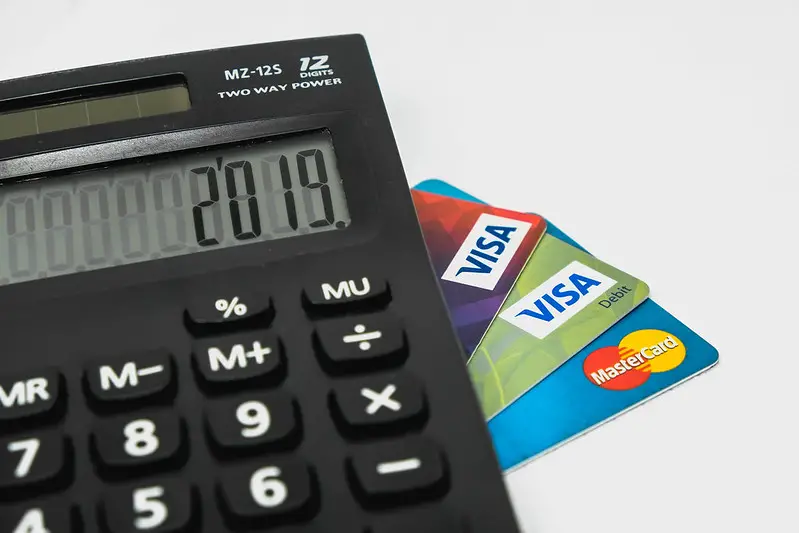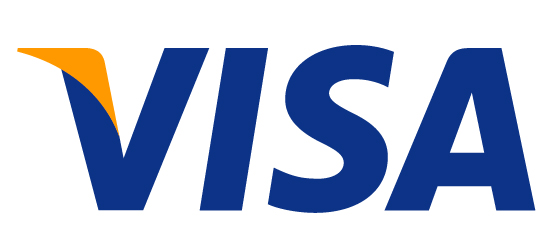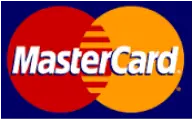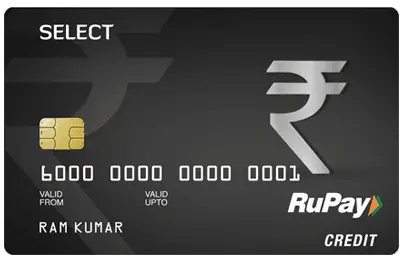PERSONAL FINANCE FINANCIAL PLANNING TAX PLANNING BANK ACCOUNTS INSURANCE DEPOSITS STOCKS MUTUAL FUNDS Tax Planning for FY 2023-24
CREDIT CARD
MANAGE YOUR CREDIT CARD
WHAT IS A CREDIT CARD ?
According to wikipedia , a credit card is a payment card, usually issued by a bank, allowing its users to purchase goods or services or withdraw cash on credit. Using the card thus accrues debt that has to be repaid later. Credit cards are one of the most widely used forms of payment across the world.
Credit cards have a printed or embossed bank card number . The card number's prefix, called the Bank Identification Number is to determine the bank to which a credit card number belongs. This is the first six digits for MasterCard and Visa cards. The next nine digits are the individual account number, and the final digit is a validity check digit.
A credit card issuing company enters into agreements with merchants for them to accept their credit cards. Merchants often advertise in signage or other company material which cards they accept by displaying .
The credit card issuer issues a credit card to a customer at the time or after an account has been approved by the credit provider, which need not be the same entity as the card issuer. The cardholders can then use it to make purchases at merchants accepting that card. When a purchase is made, the cardholder agrees to pay the card issuer.
The cardholder must pay a defined minimum portion of the amount owed by a due date or may choose to pay a higher amount. The credit issuer charges interest on the unpaid balance if the billed amount is not paid in full (typically at a much higher rate than most other forms of debt).
According to wikipedia , a credit card is a payment card, usually issued by a bank, allowing its users to purchase goods or services or withdraw cash on credit. Using the card thus accrues debt that has to be repaid later. Credit cards are one of the most widely used forms of payment across the world.
Credit cards have a printed or embossed bank card number . The card number's prefix, called the Bank Identification Number is to determine the bank to which a credit card number belongs. This is the first six digits for MasterCard and Visa cards. The next nine digits are the individual account number, and the final digit is a validity check digit.
A credit card issuing company enters into agreements with merchants for them to accept their credit cards. Merchants often advertise in signage or other company material which cards they accept by displaying .
The credit card issuer issues a credit card to a customer at the time or after an account has been approved by the credit provider, which need not be the same entity as the card issuer. The cardholders can then use it to make purchases at merchants accepting that card. When a purchase is made, the cardholder agrees to pay the card issuer.
The cardholder must pay a defined minimum portion of the amount owed by a due date or may choose to pay a higher amount. The credit issuer charges interest on the unpaid balance if the billed amount is not paid in full (typically at a much higher rate than most other forms of debt).
For latest news and guidelines on issue and usage of Credit Cards , CLICK HERE
New Updated Article
TAX PLANNING FOR FY 2023-24 ( AY 2024-25 )
Comprehensive Article on Income tax changes in Rules, Rates , Slabs , Rebates and Estimation
CLICK HERE TO READ
TAX PLANNING FOR FY 2023-24 ( AY 2024-25 )
Comprehensive Article on Income tax changes in Rules, Rates , Slabs , Rebates and Estimation
CLICK HERE TO READ
Credit Card basics - How to select one that's right for you?
1. PURPOSE OF HAVING A CREDIT CARD :
Think for what purpose you are going to use the card.
whether you intend to pay in full before due date
what are the charges issuer are going to charge
what will be the interest rate in case of delay
what rewards you are going to get on usage.
2. CHECK CARD ISSUERS : Go to websites of leading issuers and compare various cards available.
3. PAYMENT OPTION : If you intend pay in full , take card with least charges.
4. CHARGES & INTEREST : Cards are available with no joining fee and no annual fee. If you intend utilize partial payment option , take one with least interest . Our advice is to make full payment of cards before due date. Interests are very high on cards .
5. SPENDING HABIT : Depending up on your spending expectation like travel , shopping etc , chose specialized cards for the purpose . you will have more reward points on such usage.
Various Factors that weigh in selecting a credit card :
Choosing the right credit card depends on your financial goals and spending habits. Here's a breakdown of the key factors to consider:
Financial Goals:
Think for what purpose you are going to use the card.
whether you intend to pay in full before due date
what are the charges issuer are going to charge
what will be the interest rate in case of delay
what rewards you are going to get on usage.
2. CHECK CARD ISSUERS : Go to websites of leading issuers and compare various cards available.
3. PAYMENT OPTION : If you intend pay in full , take card with least charges.
4. CHARGES & INTEREST : Cards are available with no joining fee and no annual fee. If you intend utilize partial payment option , take one with least interest . Our advice is to make full payment of cards before due date. Interests are very high on cards .
5. SPENDING HABIT : Depending up on your spending expectation like travel , shopping etc , chose specialized cards for the purpose . you will have more reward points on such usage.
Various Factors that weigh in selecting a credit card :
Choosing the right credit card depends on your financial goals and spending habits. Here's a breakdown of the key factors to consider:
Financial Goals:
- Rewards: Are you looking for cash back, travel points, or rewards for specific categories like groceries or gas?
- Balance Transfer: If you're carrying a balance on another card, a card with a 0% introductory APR on balance transfers can help you save on interest while you pay it down.
- Building Credit: If you're new to credit, consider a secured card or a starter card with a low limit to build your credit history.
- Categories: Analyze your spending to see where you spend the most. Cash back cards often offer bonus rewards in certain categories, so choose a card that aligns with your spending.
- Frequency: If you carry a balance from month to month, prioritize cards with low interest rates.
- Annual Fees: Some cards with rich rewards programs have annual fees. See if the rewards outweigh the annual fee.
- Interest Rates: Even if you plan to pay your balance in full each month, consider the interest rate in case of emergencies.
- Welcome Offers: Many cards offer sign-up bonuses for meeting a minimum spending requirement within a set timeframe
- Perks and Benefits: Travel insurance, purchase protection, extended warranties, and airport lounge access are some additional benefits to consider.
- Check your credit score: This will affect your eligibility and the interest rates you're offered.
- Compare cards: Use comparison tools or financial websites to compare different card options.
SOME LEADING ISSUERS OF CREDIT CARDS IN INDIA
|
You can directly go to their links below and see what they offer
ICICI BANK LTD STATE BANK OF INDIA HDFC BANK LTD STANDARD CHARTERED BANK HSBC BANK LTD Most of the Nationalized banks , for example Indian Overseas Bank , also issue credit cards. If you have account with them, you can directly approach them. Even many Indian Pvt sector Bank issue credit cards . You can use your existing relationship with the bank for obtaining credit car |
 Cake for the Future Cake for the Future
Plan your Expenses Plan Credit Card use Tweak your Bank Account and Earn Extra Income Click Below to Read HAVE CAKE AND EAT IT |
NOW YOU CAN CHOOSE THE CARD NETWORK :
RBI HAS APPROVED 5 NET WORKS :
VISA : Visa Network is most popular among all networks which connect Credit card Issuers , Merchants accepting the cards and holders of cards . Partner banks issue VISA branded credit cards which signifies that network partners of Visa accept the cards . Visa do not issue credit cards directly and they connect and facilitate payment process .
MASTERCARD : Its operations are similar to Visa and they also do not issue credit cards directly .
AMERICAN EXPRESS : American express maintains network as well as issues credit cards directly .
RUPAY : Only Indian Payment Network operated by NCPI
DINERS CLUB INDIA : It has limited merchant network
ADVANTAGES AND DISADVANTAGES OF CARD NETWORKS :
Visa and Mastercard:
If you have more than one card , you may select different network for each card to enjoy the benefits of many networks .
VISA : Visa Network is most popular among all networks which connect Credit card Issuers , Merchants accepting the cards and holders of cards . Partner banks issue VISA branded credit cards which signifies that network partners of Visa accept the cards . Visa do not issue credit cards directly and they connect and facilitate payment process .
MASTERCARD : Its operations are similar to Visa and they also do not issue credit cards directly .
AMERICAN EXPRESS : American express maintains network as well as issues credit cards directly .
RUPAY : Only Indian Payment Network operated by NCPI
DINERS CLUB INDIA : It has limited merchant network
ADVANTAGES AND DISADVANTAGES OF CARD NETWORKS :
Visa and Mastercard:
- Advantages:
- Globally accepted - Use them almost anywhere in the world.
- Widely accepted in India - Accepted by most merchants and ATMs.
- Often have reward programs - Earn cashback, travel points, or other benefits.
- Disadvantages:
- Higher transaction fees - Can cost merchants more, potentially leading to higher prices for you.
- Annual fees - Some cards have annual fees that can eat into your rewards.
- Advantages:
- Generally good international acceptance - Though not as widespread as Visa/Mastercard.
- Premium rewards and benefits - Often offer exclusive airport lounge access, travel insurance, and concierge services.
- Disadvantages:
- Lower acceptance in India - Compared to Visa/Mastercard and RuPay, AmEx might not be accepted everywhere.
- Higher annual fees - AmEx cards are known for their steeper annual fees.
- Advantages:
- Limited acceptance in India - Only accepted by a select few merchants and ATMs.
- Focus on travel benefits - May offer travel insurance and airport lounge access on certain cards.
- Disadvantages:
- Least accepted network in India - Not a good choice for everyday transactions.
- Often high annual fees - The limited acceptance might not justify the annual fees.
- Advantages:
- Domestic acceptance - Widely accepted across India at ATMs and POS machines.
- Lower fees - Lower transaction fees for merchants can translate to lower prices for you.
- Government initiative - Supports domestic financial infrastructure.
- Disadvantages:
- Limited international acceptance - Primarily for use within India, with some recent expansion overseas.
- Fewer rewards programs - Generally fewer reward options compared to Visa/Mastercard or AmEx.
- If you travel internationally frequently, Visa or Mastercard are the best options.
- For everyday transactions within India, RuPay is a good choice due to lower fees and wide domestic acceptance.
- If you prioritize rewards and benefits, consider Visa/Mastercard or AmEx, but be aware of annual fees and acceptance limitations.
- Diners Club cards might not be the best choice in India due to limited acceptance.
If you have more than one card , you may select different network for each card to enjoy the benefits of many networks .
Safety Tips for Usage of Cards 1. Sign the signature panel on the back of your card as soon as you get .
2. Never keep your PIN code in the same place as your card. 3. Keep your account number private. 4. Make sure your devices and networks are secure. 5. Shop online only on trusted web sites. 6. Keep your passwords a secret. 7. Have a tab on your account . Check often. 8. The most important tip - USE YOUR CARD JUDICIOUSLY Use your card for what you need to buy . Never buy just because your card has a spending limit. To understand how to manage your credit card bills efficiently, check out the video below 'Credit Card Debt Explained With a Glass of Water'. |
|
Credit Card Fraud
Although there is no way to foolproof a credit card fraud, there are ways to reduce chances or reduce the damage it can do to you.
Some tips -
1. Keep tabs on your account . Check often.
2. Store the phone number of your credit card companies in your mobile for stolen credit card reporting. Call them immediately once you find out your card is stolen to cancel your card, and dispute any transactions you have not made.
Some tips -
1. Keep tabs on your account . Check often.
2. Store the phone number of your credit card companies in your mobile for stolen credit card reporting. Call them immediately once you find out your card is stolen to cancel your card, and dispute any transactions you have not made.
PRECAUTIONS WHILE INVESTING : CLICK HERE TO READ
TAX ON RETIREMENT
MORE THAN 15000 VIEWS
CLICK HERE TO READ
HOW TO LINK YOUR AADHAR TO PAN ? CLICK HERE
WHAT IS NEW ON PLAN N PROGRESS ?





